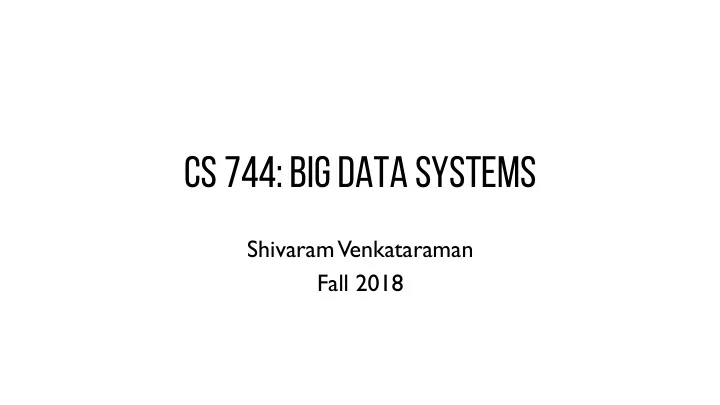

CS 744: Big Data Systems Shivaram Venkataraman Fall 2018
Administrivia • Course Project round 3 meetings signup! • Final class on Dec 6 th • No class on Dec 11 th Poster session Dec 13 th – More details very soon! •
RDMA: REMOTE DIRECT MEMORY ACCESS
MOTIVATION Need to access remote data fast - Increasing NIC speeds (up to 100Gbps) - OS/CPU bottlenecks RDMA - Perform direct memory access (DMA) from NIC! - Bypass remote CPU, OS etc. RDMA cost / availability
FaRM Approach - Model distributed memory as shared address space - Communication primitives over RDMA Features - Memory Management - Transactions - Datastructures
COMMUNICATION PRIMITIVES Key idea: One sided RDMA read/writes How to implement writes ? - Circular buffer on receiver - Recv polls at “Head” - Sender writes at “Tail” - Ensure sender doesn’t overwrite
COMMUNICATION PRIMITIVES
RDMA Challenges Page Table Size - Doing DMA requires NIC to cache page tables - Need for larger pages to make page table smaller - PhyCo – kernel driver that allocates 2GB pages! Caching queue pair data - Need a queue pair (connection) between every sender-receiver - 2*m*t^2 for m machines, t threads per machine - Solution: Share queue pair among threads – 2*m*t/q
CONNECTION MULTIPLEXING
FARM API
MEMORY MANAGEMENT Every 2GB alloc is region 32-bit id, 32-bit offset Map regions in hash ring Why multiple rings ? Parallel recovery Load balancing
MEMORY ALLOCATION Hierarchy - Slabs, regions, blocks - Thread-level, private slab allocators - Blocks multiples of size1MB - Regions on size 2GB Hints - Applications request allocation “close” - Same block as hint or same region or nearby position
TRANSACTIONS Transaction components - Reuse standard protocols from DB (2-phase commit, OCC) - Components: Read set, write set - Coordinator that runs transaction Process - Prepare message to lock write set - Validate messages to check read set - Commit messages: first to replicas then to primaries
LOCK-FREE OPERATIONS Locks are still expensive! à Design lock-free read operations Version numbers stored per-cache line – Why do we need this ? Use memory barriers to update one line at a time
HASHTABLE CHALLENGES Goals - Perform most operations using single RDMA read - Achieve good utilization (avoid resizing hash table) Challenges - Chaining / Cuckoo hashing: Key could be in many disjoint locations - Hopscotch hashing: Each bucket has a neighborhood of H-1 buckets - But large H à more reads and small H à poor utilization
HASHTABLE SOLUTIONs Soln: Chained associative hopscotch Maintain overflow chain per-bucket - Add key to overflow if reqd - Small chains limit overhead - Inline values next to key Other optimizations - Lookups use lock-free read - Combine updates in 1 transaction
SUMMARY New networking hardware enables fast systems Insights Avoid CPU overheads using RDMA read Design higher-level primitives based on that Drawbacks Need to do multiple round trips ? Hardware dependent wins ?
Recommend
More recommend